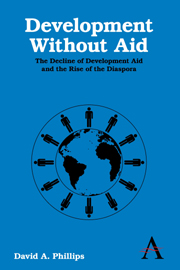Book contents
- Frontmatter
- Contents
- List of Acronyms
- Acknowledgments
- 1 Introduction: Motivation and Perspective
- 2 What Is Foreign Aid, Who Does It, Why and How Much Is There?
- 3 How Far Has Development Aid Been Effective?
- 4 Why Has Development Aid Done So Little?
- 5 Changing the Dynamics of Development
- 6 “New Aid”: New Ways to Promote and Finance Development?
- 7 Another Pathway Out of Poverty?
- 8 Exit Strategy – Replacing Foreign Assistance
- 9 Postscript
- Notes
- Index
7 - Another Pathway Out of Poverty?
Published online by Cambridge University Press: 05 July 2013
- Frontmatter
- Contents
- List of Acronyms
- Acknowledgments
- 1 Introduction: Motivation and Perspective
- 2 What Is Foreign Aid, Who Does It, Why and How Much Is There?
- 3 How Far Has Development Aid Been Effective?
- 4 Why Has Development Aid Done So Little?
- 5 Changing the Dynamics of Development
- 6 “New Aid”: New Ways to Promote and Finance Development?
- 7 Another Pathway Out of Poverty?
- 8 Exit Strategy – Replacing Foreign Assistance
- 9 Postscript
- Notes
- Index
Summary
You cannot eliminate official ODA; that would be crazy and unproductive.
Kevin Rudd, Australian foreign minister (November 2010)I have long believed that far from being a catalyst, foreign aid has been the biggest single inhibitor of Africa's growth. Among its shortcomings, aid is correlated with corruption, fosters dependency, and invariably instills bureaucracy that hinders the emergence of an essential entrepreneurial class.
Dambisa Moyo (2008)Private Flows and Foreign Aid
The fundamental issue that I have tried to investigate in this book is how far the people of the poorest and most aid-dependent countries can begin to move beyond their need for foreign aid and, thereby, assume or resume sovereignty over their development process. One pathway to this objective is for poor economies to incorporate diaspora resources as a complement to expanding their own. Taking account of this, one plausible solution for development assistance might be a “re-emphasis.” This might mean, for example, retaining the current direction of assistance but shifting a little bit. New Aid could be repackaged to support more those private flows – moving for example from “aid for capacity building” to a new solution called “aid for remittances.” Thus, the story would go that the poorest countries need to leverage the full menu of resources – both public and private, and aid needs to be there to help them to do it.
- Type
- Chapter
- Information
- Development without AidThe Decline of Development Aid and the Rise of the Diaspora, pp. 155 - 166Publisher: Anthem PressPrint publication year: 2013



